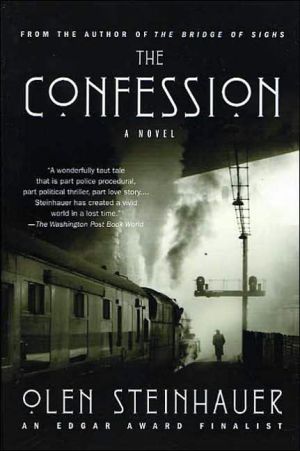

 |

|

The average rating for Confession based on 2 reviews is 4 stars.
Review # 1 was written on 2012-09-17 00:00:00 Wayne Troy Wayne TroyThe second book in a five-book series by Olen Steinhauer, The Confession is an interesting move by the author. Most series stay with the same point-of-view character (or characters, if there is more than one), so I was expecting The Confession to continue with Emil Brod, the hero of Bridge of Sighs. But Steinhauer not only departs from that tradition, but also changes the narrative voice; where Bridge of Sighs was a third-person narrative, The Confession is told in first-person, from the point of view of Ferenc Kolyeszar -- a character barely mentioned in the previous novel. The Confession begins eight years after Bridge of Sighs. Kolyeszar's marriage to his beautiful wife is in trouble, and he suspects her of infidelity. Distracted from his work as a homicide investigator for the People's Militia, he brushes off his partner's suggestion that an apparent suicide is something more sinister. Then another body turns up, and Kolyeszar finds himself splitting his time between murder, corrupt politicians, and his crumbling marriage. While still a good book with a few twists and turns, The Confession nevertheless isn't quite as good as Bridge of Sighs, and pales in comparison to Steinhauer's newer books in the Milo Weaver series (The Tourist, Nearest Exit, and An American Spy). I'm still eager to read the next book in the series, 36 Yalta Boulevard, which leaps another ten years and seems to focus on a new character. And even if this novel isn't quite as good as the author's other books, it's still better than most novels on the shelves these days. |
Review # 2 was written on 2012-04-18 00:00:00 Steven Burrows Steven BurrowsAn Historical Thriller with an Insider's View of Communism in Eastern Europe 1956: Nikita Khruschev's Secret Speech denouncing Stalin's crimes; the Hungarian uprising and unrest in Poland it triggered; the British, French, and Israeli invasion of Egypt following Gamal Abdel Nasser's nationalization of the Suez Canal; Sputnik's launch. It was a watershed year, somewhat comparable to 1968 more than a decade later. In The Confession, we view the world of 1956 through the eyes and the troubled mind of Ferenc Kolyeszar, a policeman in a fictional Eastern European country somehow nestled among Hungary, Poland, Czechoslovakia, and Romania. However, Kolyeszar is a novelist as well as a policeman, having published a well-received novel about his experiences as a soldier resisting the German occupation at the outset of World War II. Now 37 years old, he is writing The Confession to chronicle his shattering experiences at home and at work against the backdrop of fateful world events. Kolyeszar's story involves the unraveling of his marriage to Magda, the disappearance of a senior official's young wife; the sometimes rocky relationships among Kolyeszar and Stefan, Emil, Leonek, and Brano, his fellow police officers in the District; Stefan's reopened investigation into the murder of his partner immediately after the War; and the visit to the District of a KGB Colonel from Moscow named Kaminski. These parallel story lines weave in and out of one another, converging in a climactic end-game that brings a just conclusion to The Confession. Along the way we become immersed in the endless strain as Communist rule solidifies in Eastern Europe with mounting ferocity. This is an engrossing and skillfully written story. Olen Steinhauer's The Confession is the second in a cycle of five novels set a decade apart from one another about the men of the District. Its predecessor, The Bridge of Sighs, was written from the perspective of Kolyeszar's colleague Emil Brod and took place in 1948-49. The subsequent three novels carry the story forward to the fall of Communism in 1989. To my mind, judging from what I've read so far, this five-book cycle is as insightful a history of Eastern Europe under Communism as any history of the period. (From www.malwarwickonbooks.com) |
CAN'T FIND WHAT YOU'RE LOOKING FOR? CLICK HERE!!!